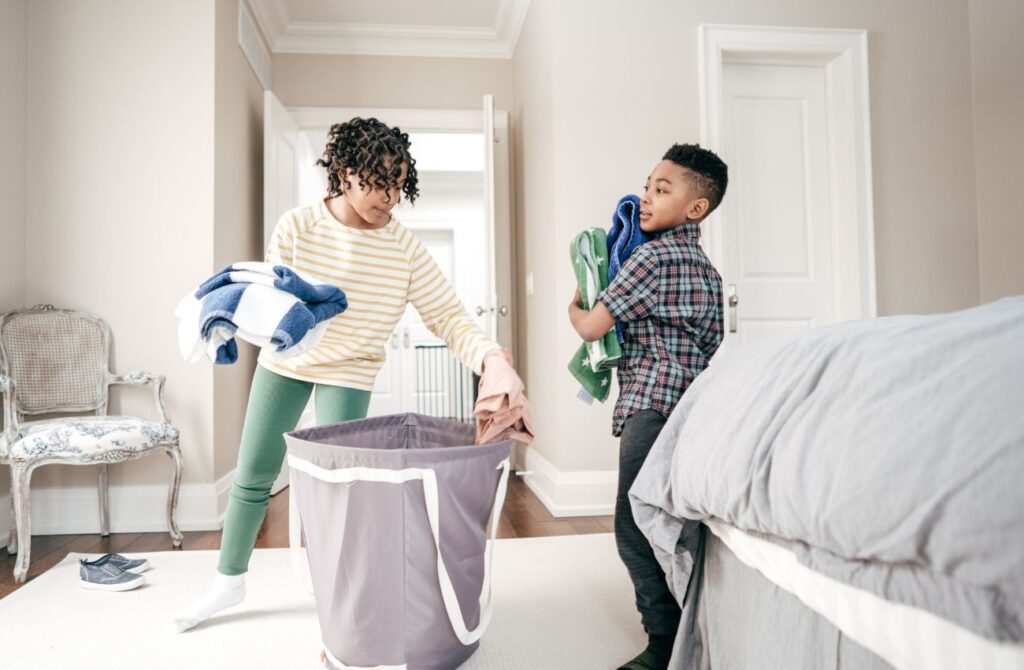Kids and Chores: A Perfect Match
Do you ever wonder if your kids should be doing chores? Our advice? YES! A thousand times yes--and here's why.

Chores—kids hate them; parents hate fighting over them. And honestly, we don’t blame anyone. The truth is, no matter how many sticker charts you put up, chores aren’t fun. But do you know what else is not fun? Trying to do everything yourself and letting your kids grow up to think that that’s ok.
As parents, one of our jobs is to make sure that our kids grow up to be kind, honest, functional members of society. Teaching them the importance of helping around the house is one of the easiest ways to get them there. Which is why Bucks County Parent is doing the work for you, and getting all of your burning questions answered about chores, why we should dole them out between kids, and how.
Why chores are important
Some might argue that kids should spend their childhood “being kids.” And while we don’t disagree, we think it’s safe to say that kids can be kids and learn all at the same time. After all, we send our kids to school because we know that education is important, right? So why wouldn’t we take the time to teach them important life skills at home as well?
If it helps, think of doing chores as a kind of basic training for life. You wouldn’t expect a new police officer to serve and protect without first teaching them how, would you? In the same way, we can’t expect our kids to grow up and magically know what to do. Sure, they’ll eventually figure out how to do the laundry and vacuuming isn’t exactly rocket science, but that’s not the point. Research shows that children who do chores from a young age grow up to be more independent, competent, altruistic adults. And who doesn’t want that for their kids?

It’s about more than just laundry
In addition to all the practical reasons for doing chores (we’re looking at you laundry pile), there’s a great deal of life lessons to be learned along the way as well. For one thing, when everyone comes together to pitch in and take care of the home they share, the family dynamic goes from being one of parents taking care of children, to one more closely resembling a team, and when you’re on a team, everyone works together. Even the youngest family members can get behind a team mentality, and the lessons they’ll learn about cooperation and shared responsibility will prove invaluable as they head off to school later.
Another basic but important part of being on a team is the simple act of showing up. When you’re part of a team, you don’t just come and go as you please or when you feel like it. You show up every day. You practice and work together towards a common goal–whether you’re feeling up to it or not. As parents, we all know what it’s like to not always feel like going to work or buying groceries, but we know that if we don’t our family will suffer. So, we do. Doing chores allows children to get a little taste of what that’s like and teaches them to push through even when they don’t necessarily want to.

To pay or not to pay, that is the question
As far as paying for chores goes, the experts are divided on this one.
On the one hand, paying for chores is an easy way to associate making money with working hard. But what happens when your child doesn’t care about having extra spending money? Or perhaps the birthday money they got from grandma is more than enough to cover their wants for a whole year. How do you get them to pitch in then?
Here’s what some seasoned pros had to say:
“When our kids were young, my husband and I disagreed on whether or not we should do the allowance thing. After all, he had grown up receiving one and I didn’t. In the end, we compromised. After dinner chores and basic self-care like laundry were non-negotiable and unpaid, but extras like vacuuming and mowing the lawn (when they were older of course) earned them some spending cash. The bigger/harder the chore, the more money it was worth.”
Lauren & Greg S.
Angelina of Yardley, hard-working mom of two, takes a slightly different approach.
I tell my kids all the time that their job as children is to learn as much as they can, show their family and friends kindness and love through helpfulness, and have fun. There will be plenty of time for making money when they grow up. Besides, there’s a lesson to be learned in saving that birthday money as well.
Whatever you decide, the important thing to remember is that the lessons learned, whether paid or unpaid, will serve your children well throughout their lives.
Where to start
Here are just a few ways that everyone (no matter the age) can start helping out.
Ages 2-3
- Put away toys
- Help mom or dad load washer/dryer
- Dust with a cloth
- Pairing socks (this one has the added bonus of helping with fine motor skills)
Ages 4-6
- Help clear the table
- Put clothes in the hamper
- Feed pets
- make their beds
- Water plants
Ages 7-9
- Unload/load dishwasher
- Sweep/vacuum
- Wipe down tables and counters
- Put away groceries
Ages 10+
- Take out the trash/recycling
- Clean the windows
- Clean the bathrooms
- Change their own sheets
- Do their own laundry
- Help prep/cook dinner
Admittedly, having to teach our kids all this stuff at first won’t be fun, and to be honest it probably won’t even be very helpful, but we promise, in the end it will certainly be worth it.
Have any questions or maybe some more helpful, chore-related tips for us? Share them on our Bucks County Parent Community page so that we can all learn and grow together.
Featured images courtesy of Canva



NO COMMENTS